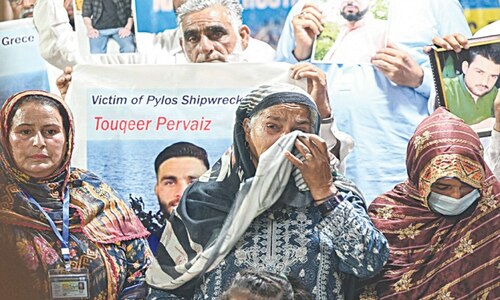ISLAMABAD, Dec 1: The Supreme Court on Thursday overturned remissions granted by a high court to students convicted of murdering a Faisalabad professor and restored capital punishment for two and life terms for five of them. “The murder of Prof Abdul Lateef was not the result of personal enmity as he was murdered for not allowing Shehzad alias Toti to use unfair means in the examination hall in line with his official duty,” the 36-page judgment available to Dawn said.
Authored by Justice Javed Iqbal, the judgment upheld the trial court’s order of awarding death sentences to Sharafat Ali and Shehzad alias Toti with a fine of Rs200,000 each in the year 2000 murder case.
Likewise other accomplices namely Zahid Imran, Mohammad Afzal, Shahid Ali, Mohammad Anwar and Sajid Masih were sentenced to life imprisonment with a fine of Rs100,000 each.
The judgment accepted the appeal of Ms Shamim Lateef, the widow of Prof Lateef, against the Lahore High Court order which curtailed the sentences, and dismissed the appeals of accomplices against their conviction.
A teacher at the Municipal Government Degree College Faisalabad, Prof Abdul Lateef was posted as Deputy Superintendent Examination at the Government College Centre Gojra to conduct B.A. examination.
On April 4, 2000, during the examination, the professor found Shahzad alias Toti of using unfair means in the examination hall. When Shahzad was stopped, he left the hall threatening Prof Lateef of dire consequences as he was the son of the then president of the Gojra Bar Association. Later in the evening with the help of six accomplices he thrashed the professor with iron fist and sticks.
On March 4, 2003, LHC set aside the sentence awarded by the trial court after reducing their sentence to 14 years under Tazir with a direction to pay Diyat of Rs27 million jointly to the deceased family.
“The manner the murder of the late professor was committed created sensation and terror in the entire teaching class,” the judgment said adding the killing was deliberate, premeditated with common intention and prior concert of mind.
The murder was an act of terrorism and sentence of death has rightly been awarded under Section 7-A of the Anti-Terrorism Act 1997 as when an action of accused results in striking terror or creating fear, panic, sensation, helplessness and sense of insecurity among people of a particular vicinity, it amounts to terror and such an action squarely falls within the ambit of Section 6 of the Anti Terrorist Act 1997, said the judgment.










































Dear visitor, the comments section is undergoing an overhaul and will return soon.